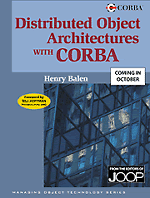Book contents
- Frontmatter
- Contents
- Foreword
- Acknowledgments
- Chapter 1 Introduction
- Chapter 2 Distributed Objects
- Chapter 3 Partitioning, Interfaces, and Granularity
- Chapter 4 Meta-Information
- Chapter 5 Life Cycle And Persistence
- Chapter 6 Transactions
- Chapter 7 Security
- Chapter 8 CORBA and the Internet
- Chapter 9 Architecture Considerations for Deployment
- Appendix: COM/CORBA Integration
- Index
Foreword
Published online by Cambridge University Press: 07 September 2010
- Frontmatter
- Contents
- Foreword
- Acknowledgments
- Chapter 1 Introduction
- Chapter 2 Distributed Objects
- Chapter 3 Partitioning, Interfaces, and Granularity
- Chapter 4 Meta-Information
- Chapter 5 Life Cycle And Persistence
- Chapter 6 Transactions
- Chapter 7 Security
- Chapter 8 CORBA and the Internet
- Chapter 9 Architecture Considerations for Deployment
- Appendix: COM/CORBA Integration
- Index
Summary
When we started the Object Management Group a decade ago, we could only hope that writers of the caliber of Henry Balen would take up the cause. I can remember those early days where we spent most of our time trying to explain to anyone that would listen why object technology was important. In the last ten years it has become an ever increasingly complex world, one where homogeneity of platforms is almost unheard of, and where legacy applications continue to be an integral part of the mix. It has become apparent that the old does not always make room for the new when it comes to enterprise applications. It has also become apparent that understanding the architectural issues involved in designing and structuring systems based on distributed objects is one of the major keys for successful deployment. The industry consolidation behind such standards as Common Object Request Broker Architecture (CORBA), the Unified Modeling Language (UML), and the Meta Object Facility (MOF) have immensely helped to make analysis and design easier. Moreover, there are better tools out in the market than ever before, but we have yet to automate architecture—which provides good job security for those who understand the issues!
Henry Balen's efforts in this book should provide a jump-start to those who are planning on building distributed systems using object technology. The importance of architecture cannot be overemphasized.
- Type
- Chapter
- Information
- Distributed Object Architectures with CORBA , pp. xvii - xviiiPublisher: Cambridge University PressPrint publication year: 2000



